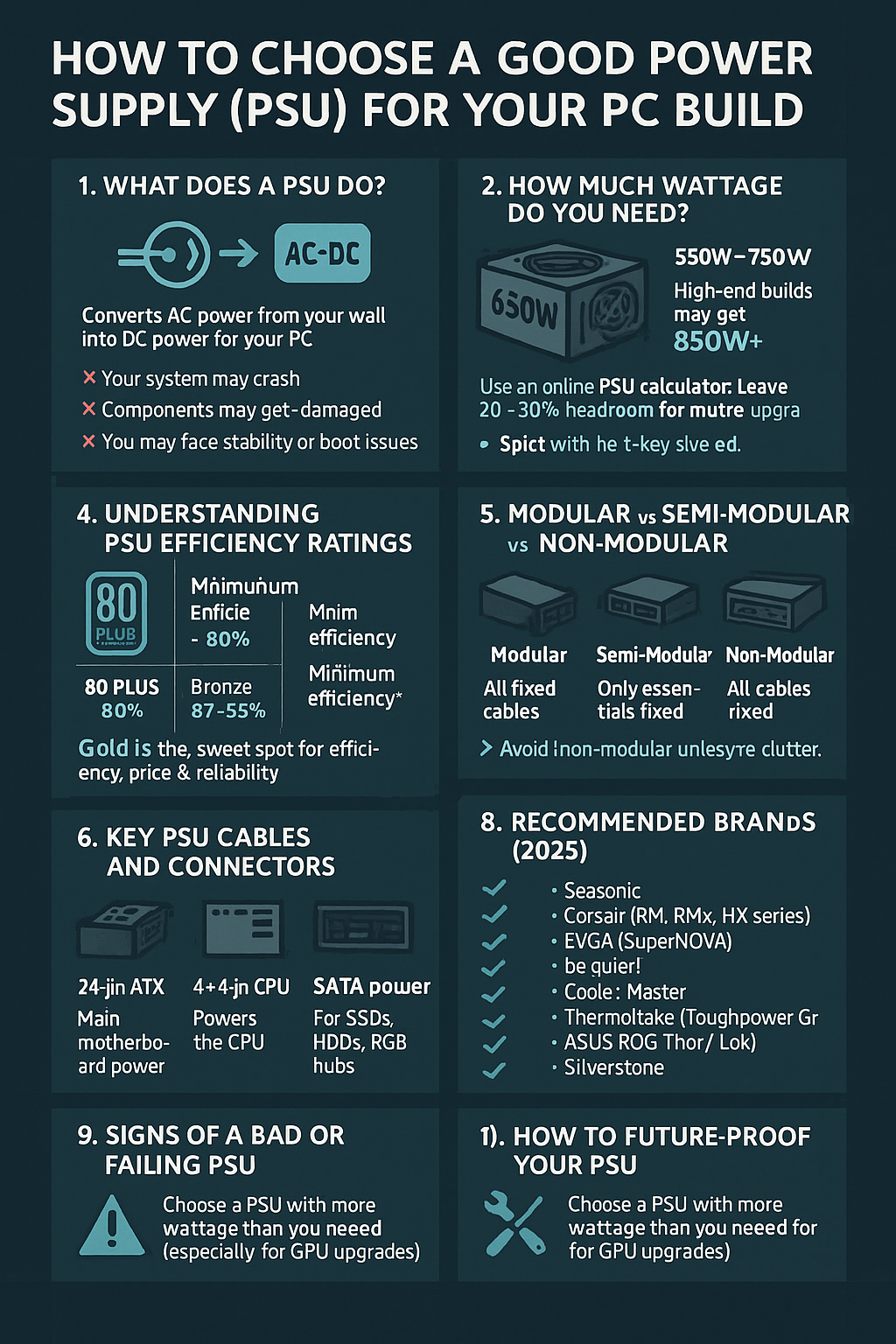The power supply unit (PSU) is one of the most critical — yet most overlooked — components of a PC. It doesn’t boost your frame rates, but it ensures every part of your system runs safely and efficiently.
In this guide, we’ll explain how to choose the right PSU, covering wattage, efficiency ratings, modularity, and safety protections.
1. What Does a PSU Do?
The PSU converts AC power from your wall into DC power your PC components can use. It also regulates and distributes that power safely across the motherboard, CPU, GPU, drives, and peripherals.
If your PSU is underpowered or poor-quality:
❌ Your system may crash
❌ Components may get damaged
❌ You may face stability or boot issues
2. How Much Wattage Do You Need?
✅ Most mid-range gaming PCs need 550W–750W
✅ High-end builds may require 850W+
Use an online PSU calculator (e.g., from Seasonic, Cooler Master, or PCPartPicker) to estimate your needs based on:
- CPU model
- GPU model
- RAM and storage
- Overclocking
- Extra fans and peripherals
💡 Always leave 20–30% headroom above your estimated wattage for future upgrades or spikes.
3. Understanding PSU Efficiency Ratings
PSUs are rated by the 80 PLUS certification, which reflects their power conversion efficiency.
| Certification | Minimum Efficiency |
|---|---|
| 80 PLUS | 80% |
| Bronze | 82–85% |
| Silver | 85–88% |
| Gold | 87–90% |
| Platinum | 90–92% |
| Titanium | 92–94% |
✅ Gold is the sweet spot for most users — great efficiency, price, and reliability
✅ Bronze is acceptable for budget builds
Higher efficiency = less wasted power, cooler temps, and quieter operation.
4. PSU Form Factors: What Fits Your Case?
The standard PSU size is ATX, which fits most mid/full towers.
Other options:
- SFX/SFX-L – smaller, for compact cases
- TFX/Flex ATX – for ultra-small builds or prebuilt PCs
💡 Double-check PSU size support in your case specs before buying.
5. Modular vs Semi-Modular vs Non-Modular
| Type | Description |
|---|---|
| Non-Modular | All cables are fixed |
| Semi-Modular | Only essentials (24-pin, CPU) are fixed |
| Fully Modular | All cables are removable |
✅ Fully modular PSUs offer the cleanest cable management
✅ Semi-modular PSUs balance price and convenience
Avoid non-modular unless you’re on a tight budget or don’t care about clutter.
6. Key PSU Cables and Connectors
✅ Make sure your PSU includes the right cables for your build:
- 24-pin ATX – main motherboard power
- 4+4-pin CPU (EPS) – powers the CPU
- 6+2-pin PCIe – for GPUs
- SATA power – for SSDs, HDDs, RGB hubs
- Molex – legacy devices (fans, adapters)
- 12VHPWR – for RTX 4000 series GPUs
📌 Always check GPU power connector requirements — especially for modern cards.
7. Safety Protections You Should Look For
Quality PSUs include built-in protections to prevent damage to your PC.
✅ Look for these protections:
- OVP – Over Voltage Protection
- UVP – Under Voltage Protection
- OCP – Over Current Protection
- OPP – Over Power Protection
- SCP – Short Circuit Protection
- OTP – Over Temperature Protection
Stick with brands that are trusted and certified — no-name PSUs can be dangerous.
8. Recommended Brands (2025)
These brands consistently deliver reliable power supplies:
- Seasonic
- Corsair (RM, RMx, HX series)
- EVGA (SuperNOVA)
- be quiet!
- Cooler Master
- Thermaltake (Toughpower GF series)
- ASUS ROG Thor / Loki
- SilverStone (especially for SFX)
Avoid ultra-cheap options with vague specs or no efficiency certification.
9. Signs of a Bad or Failing PSU
Watch out for these red flags:
❌ Random shutdowns or reboots
❌ Coil whine or buzzing
❌ Burning smell or excessive heat
❌ Inconsistent booting
❌ GPU not receiving power
❌ PSU fan not spinning under load
If your PC acts unstable with no clear cause, suspect the PSU.
10. How to Future-Proof Your PSU
- Choose a PSU with more wattage than you need (especially for GPU upgrades)
- Get modular cables to support future GPUs and case layouts
- Pick a model with long warranty (7–10 years is ideal)
- Stick to 80 PLUS Gold or higher
- Make sure it includes modern connectors (12VHPWR, Type-C headers if needed)
Your PSU may outlive the rest of your system — so invest in quality.
Final Thoughts
Your power supply is the foundation of your PC — don’t cheap out on it.
✅ Aim for reliable brands
✅ Get the right wattage + headroom
✅ Choose modular when possible
✅ Prioritize efficiency and protections
The right PSU will keep your system running stable, cool, and safe for years to come.
